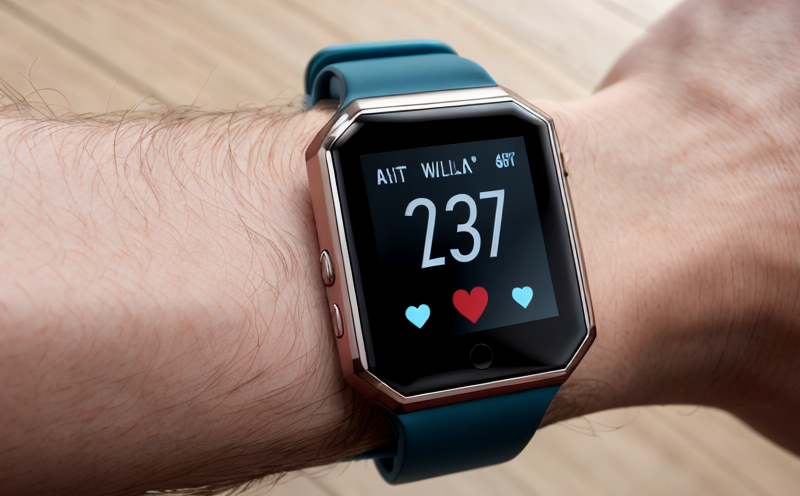IEC 60068-2-75 Mechanical Impact Testing for Wearables
The International Electrotechnical Commission (IEC) standard IEC 60068-2-75 is a critical guideline for ensuring that wearable devices and digital health products meet stringent mechanical impact requirements. This test evaluates how well the device can withstand mechanical shocks, vibrations, and impacts under various environmental conditions.
Wearable technology encompasses a wide range of electronic devices that are worn on or near the body to monitor physiological data, provide feedback, or offer assistance in daily activities. These include smartwatches, fitness trackers, medical-grade monitoring devices like heart rate monitors, and more advanced systems such as implantable cardiac defibrillators. The mechanical impact testing specified by IEC 60068-2-75 is essential for validating the durability of these devices.
The standard is designed to simulate real-world conditions that a wearable device might encounter during use or transport, ensuring that it remains functional and safe even when subjected to sudden impacts. Compliance with this test provides assurance that the device will perform reliably under anticipated stress without compromising safety or functionality.
Testing according to IEC 60068-2-75 involves subjecting specimens to controlled mechanical shock events using specialized equipment. The test conditions can vary depending on the specific requirements of the product, but typically include drop tests from various heights onto different surfaces and under different environmental conditions like temperature cycling.
This testing is particularly important for consumer electronics where accidental impacts are common during normal usage or transportation. However, in medical applications, ensuring robustness against mechanical shocks can be a matter of life and death. For instance, if a wearable device used to monitor vital signs were to fail due to an impact, it could lead to critical errors that jeopardize patient safety.
The standard provides detailed guidance on the preparation of test specimens, the setup of testing equipment, and the recording of results. Specimens are often chosen based on their intended use and expected environmental exposure. For instance, a fitness tracker worn while running might need to withstand drops from greater heights than one used primarily indoors.
The acceptance criteria for IEC 60068-2-75 involve assessing the integrity of the device after each test condition. A passing grade generally means that no permanent damage has occurred and that the device functions as intended post-test. This could include visual inspections, functional tests, and sometimes even durability assessments over time.
Compliance with this standard is not only about meeting regulatory requirements but also about building trust with consumers and healthcare providers alike. By adhering to IEC 60068-2-75, manufacturers demonstrate their commitment to delivering high-quality products that can withstand the rigors of everyday life or medical environments.
In conclusion, mechanical impact testing according to IEC 60068-2-75 is a vital step in ensuring the reliability and safety of wearable devices. It helps protect consumers from potential hazards and enhances confidence among healthcare professionals who rely on these technologies for patient care.
Industry Applications
The application of IEC 60068-2-75 mechanical impact testing is widespread across various sectors, particularly in industries where wearable technology plays a crucial role. For instance, in the healthcare sector, devices such as patient monitors and implantable cardioverter-defibrillators must be robust enough to withstand accidental impacts that could occur during transport or use.
- Consumer Electronics: Smartwatches, fitness trackers, and other consumer electronics often undergo this testing to ensure they can handle daily wear-and-tear without malfunctioning.
- Military Applications: Wearable devices used by military personnel need to be resilient enough to survive harsh field conditions, including impacts from falls or accidental bumps.
- Aerospace Industry: Devices intended for use in space missions must pass rigorous mechanical impact tests to ensure they can operate reliably even under extreme environmental stress.
In each of these applications, the primary goal is to verify that the device will continue to function correctly after being subjected to mechanical shocks. This ensures not only product safety but also enhances user confidence in the technology.
Quality and Reliability Assurance
The implementation of IEC 60068-2-75 mechanical impact testing is integral to quality assurance programs aimed at ensuring the reliability and durability of wearable devices. By subjecting prototypes or production units to controlled mechanical shocks, manufacturers can identify potential weaknesses early in the development process.
One key aspect of this testing is the ability to replicate real-world scenarios where a device might experience an impact. This includes simulating falls from varying heights onto different surfaces and considering temperature variations that could affect material properties and performance.
The standard also emphasizes thorough documentation throughout the testing process, including detailed records of all test conditions applied, observed effects on the specimen, and any subsequent repairs or replacements required due to damage sustained during testing.
For quality assurance teams, compliance with IEC 60068-2-75 provides a structured approach to evaluating product robustness. It helps establish benchmarks against which future improvements can be measured, ensuring continuous enhancement of existing products and setting standards for new innovations in the field.
In addition to immediate benefits during development stages, long-term adherence to these rigorous testing protocols contributes significantly towards building brand reputation among both consumers and professionals within relevant industries. A proven track record of successful completion of mechanical impact tests serves as a testament to a company's commitment to delivering top-tier products that can be trusted in demanding environments.





